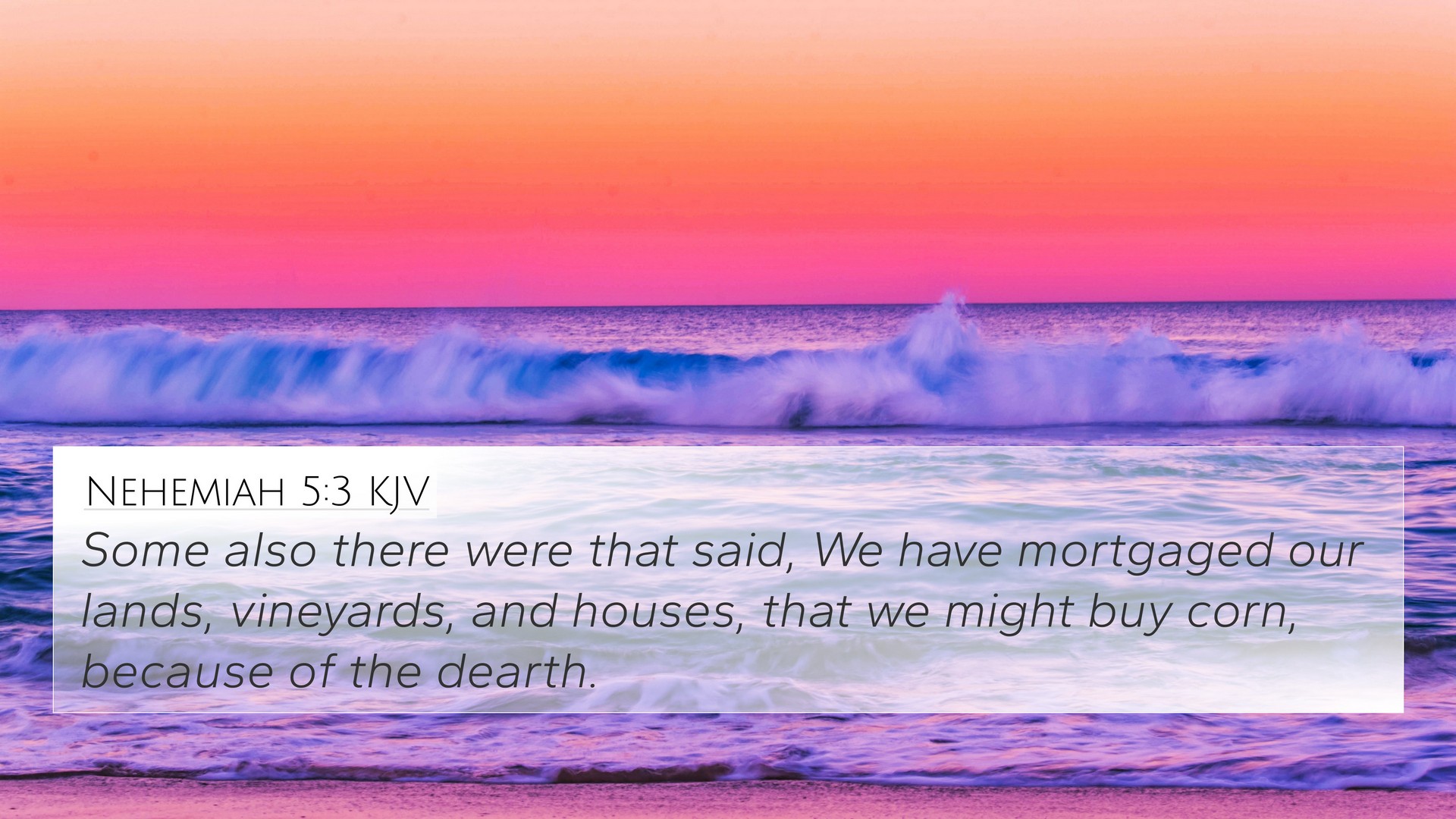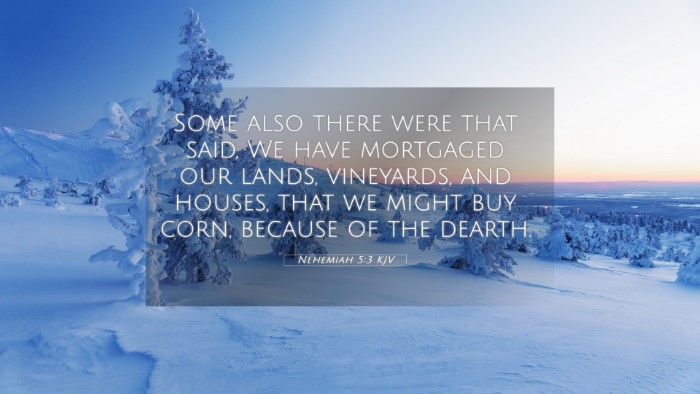Old Testament
Genesis Exodus Leviticus Numbers Deuteronomy Joshua Judges Ruth 1 Samuel 2 Samuel 1 Kings 2 Kings 1 Chronicles 2 Chronicles Ezra Nehemiah Esther Job Psalms Proverbs Ecclesiastes Song of Solomon Isaiah Jeremiah Lamentations Ezekiel Daniel Hosea Joel Amos Obadiah Jonah Micah Nahum Habakkuk Zephaniah Haggai Zechariah MalachiNehemiah 5:3 Similar Verses
Nehemiah 5:3 Cross References
Some also there were that said, We have mortgaged our lands, vineyards, and houses, that we might buy corn, because of the dearth.
Uncover the Rich Themes and Topics of This Bible Verse
Listed below are the Bible themes associated with Nehemiah 5:3. We invite you to explore each theme to gain deeper insights into the Scriptures.
Nehemiah 5:3 Cross Reference Verses
This section features a detailed cross-reference designed to enrich your understanding of the Scriptures. Below, you will find carefully selected verses that echo the themes and teachings related to Nehemiah 5:3 KJV. Click on any image to explore detailed analyses of related Bible verses and uncover deeper theological insights.
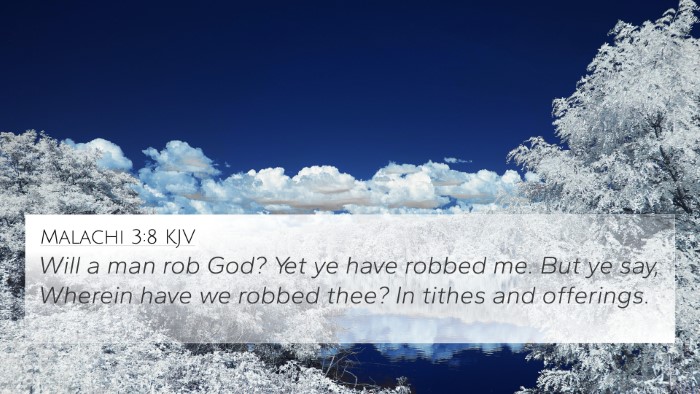
Malachi 3:8 (KJV) »
Will a man rob God? Yet ye have robbed me. But ye say, Wherein have we robbed thee? In tithes and offerings.
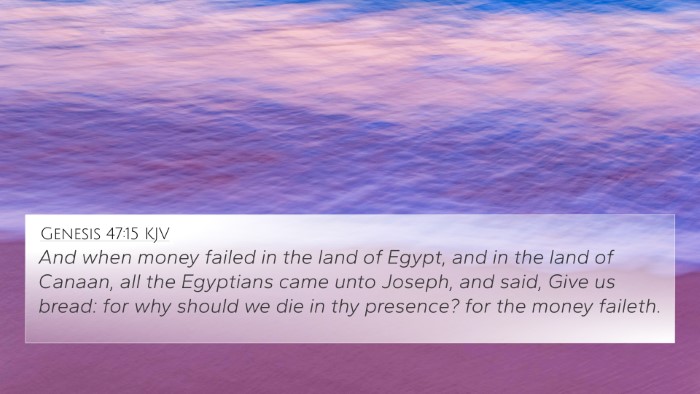
Genesis 47:15 (KJV) »
And when money failed in the land of Egypt, and in the land of Canaan, all the Egyptians came unto Joseph, and said, Give us bread: for why should we die in thy presence? for the money faileth.
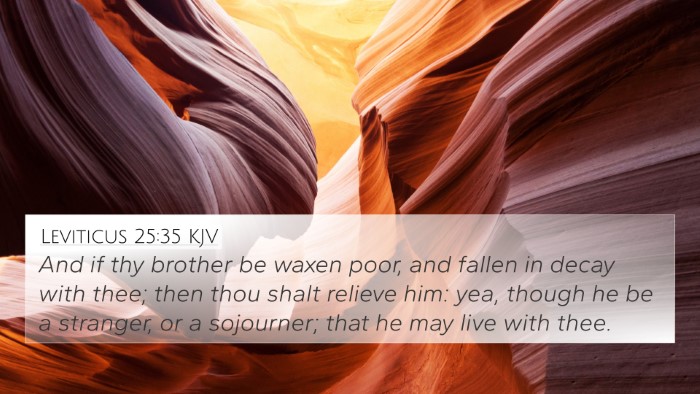
Leviticus 25:35 (KJV) »
And if thy brother be waxen poor, and fallen in decay with thee; then thou shalt relieve him: yea, though he be a stranger, or a sojourner; that he may live with thee.
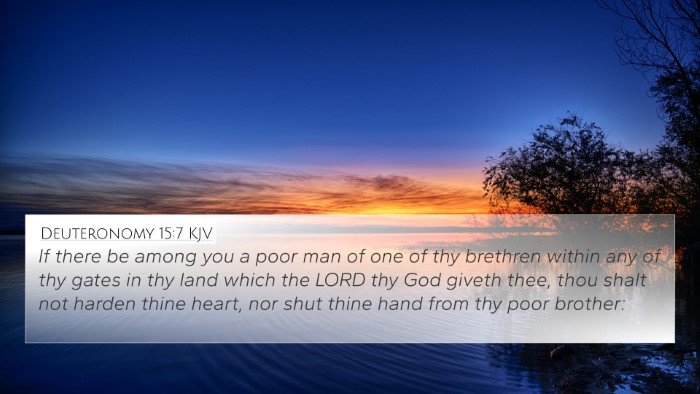
Deuteronomy 15:7 (KJV) »
If there be among you a poor man of one of thy brethren within any of thy gates in thy land which the LORD thy God giveth thee, thou shalt not harden thine heart, nor shut thine hand from thy poor brother:
Nehemiah 5:3 Verse Analysis and Similar Verses
Understanding Nehemiah 5:3
Nehemiah 5:3 states: "Some also there were that said, We have mortgaged our lands, vineyards, and houses, that we might buy corn because of the dearth." This verse reveals the struggle faced by the people of Judah during a time of famine.
Verse Meaning and Insights
This verse encapsulates a significant moment of distress among the people. Nehemiah addresses the oppression of the poor by the wealthy, and amidst hardship, they resort to extreme measures to sustain themselves.
Insights from Public Domain Commentaries
-
Matthew Henry:
Henry emphasizes the economic hardships that forced the people into desperate measures. The mortgaging of personal property illustrates the depth of their plight and the strain of the famine.
-
Albert Barnes:
Barnes notes that this verse reflects on the communal aspect of suffering during famine. The act of mortgaging their lands represents a lack of resources and highlights the necessity of solidarity among the people when under duress.
-
Adam Clarke:
Clarke points out that this situation demonstrates both the physical and spiritual struggles the Israelites faced. It illustrates the extreme conditions that can lead to compromising one's property and dignity.
Contextual Understanding
This verse is part of the broader narrative where Nehemiah returned to Jerusalem to rebuild the city and its walls, but he encountered internal strife among the people themselves. The famine exacerbated their situation, forcing them to take desperate actions.
Connections between Bible Verses
Nehemiah 5:3 connects with various other scriptures that deal with social justice, economic hardship, and God's provision:
- Proverbs 22:7: "The rich rules over the poor, and the borrower is the slave of the lender." This highlights the bonds of debt that can ensnare the poor.
- Isaiah 58:6-7: "Is not this the fast that I choose: to loose the bonds of wickedness... Is it not to share your bread with the hungry, and bring the homeless poor into your house?" This challenges the wealthy to care for those suffering like in Nehemiah's time.
- James 5:1-4: "Come now, you rich, weep and howl for your miseries that are coming upon you!" A call to recognize the repercussions of oppression and injustice against the poor.
- Matthew 25:35-40: "For I was hungry and you gave Me something to eat..." This passage mirrors the sense of community responsibility emphasized in Nehemiah.
- Luke 16:19-31: The story of the rich man and Lazarus serves as a stark reminder of the consequences of ignoring the needs of the poor.
- Exodus 22:25: "If you lend money to any of my people who are poor among you, you shall not be like a money lender to him; you shall not charge him interest." This encourages fair treatment of the poor in financial dealings.
- Psalms 41:1: "Blessed is he who considers the poor; the Lord will deliver him in time of trouble." This emphasizes the blessing that comes from caring for those in distress.
Thematic Bible Verse Connections
The themes of poverty, justice, and divine provision are woven throughout the scriptures and resonate with the circumstances faced in Nehemiah 5:3. Such themes remind believers today of the importance of caring for the vulnerable.
Applications and Reflections
Understanding Nehemiah 5:3 goes beyond historical context; it presents modern applications:
- Social Justice: Christians are called to advocate for the rights and welfare of the underprivileged.
- Compassion: Believers are encouraged to open their hearts and resources to those in need, similar to the necessity in Nehemiah's time.
- Community Support: This verse teaches the importance of supporting one another in times of crisis, replicating the communal care depicted in Nehemiah’s leadership.
Cross-Referencing Biblical Texts
To gain deeper insights into Nehemiah 5:3, utilizing tools for Bible cross-referencing can be immensely helpful. Here are some suggested methods:
- Bible Concordances: Use a concordance to find related verses that discuss themes of hardship and societal issues.
- Bible Cross-Reference Guides: Refer to guides that provide symbolic and thematic connections across scriptures.
- Cross-Referencing Bible Study: Encourage group studies focused on how these passages interact with each other.
Conclusion
In summary, Nehemiah 5:3 offers profound insights into the struggles faced by a community during a time of need. By reflecting on this verse alongside other scriptures, believers can foster a greater understanding of God’s will for justice, compassion, and community support. As the historical and spiritual implications of Nehemiah’s words resonate through time, they call for a commitment to uphold values of charity and righteousness.
